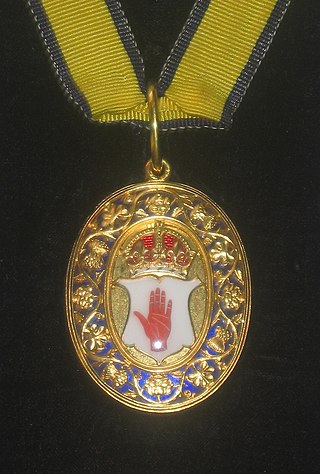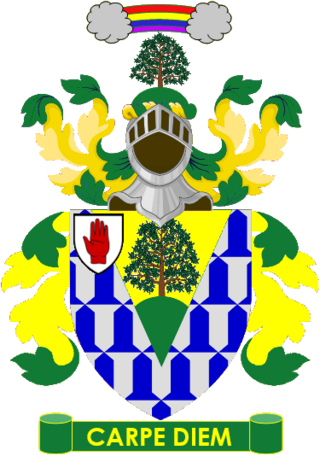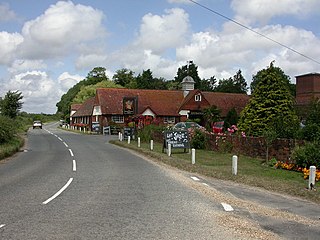
A baronet or the female equivalent, a baronetess, is the holder of a baronetcy, a hereditary title awarded by the British Crown. The title of baronet is mentioned as early as the 14th century; however, in its current usage it was created by James I of England in 1611 as a means of raising funds for the crown.
Seymour may refer to:

Baron Hazlerigg, of Noseley in the County of Leicester, is a title in the Peerage of the United Kingdom. It was created in 1945 for Sir Arthur Hazlerigg, 13th Baronet. He had previously served as Lord Lieutenant of Leicestershire. As of 2023 the title is held by his great-grandson, the fourth Baron, who succeeded his father in 2022.

Baron Moncreiff, of Tulliebole in the County of Kinross, is a title in the Peerage of the United Kingdom. It was created on 9 January 1874 for the lawyer and Liberal politician Sir James Moncreiff, 1st Baronet. He had already been created a Baronet, of Kilduff in the County of Kinross, in the Baronetage of the United Kingdom on 23 May 1871. In 1883 Lord Moncreiff also succeeded his elder brother as 11th Baronet, of Moncreiff in the County of Perth. On his death the titles passed to his eldest son, the second Baron. He was a Judge of the Court of Session from 1888 to 1905 under the title of Lord Wellwood and served as Lord Lieutenant of Kinross-shire between 1901 and 1909. He was succeeded by his younger brother, the third Baron. He was a clergyman. As of 2010 the titles are held by the latter's great-grandson, the sixth Baron, who succeeded his father in 2002.
Burrard may refer to:

General Sir Harry Burrard, 1st Baronet was a British soldier who fought in the American War of Independence, the French Revolutionary Wars and in the Peninsular War.
There have been three baronetcies created for members of the Anstruther family, two in the Baronetage of Nova Scotia and one in the Baronetage of Great Britain. Two of the creations are extant while one is extinct.
Nineteen baronetcies have been created for persons with the surname Hamilton, eight in the Baronetage of Nova Scotia, one in the Baronetage of England, five in the Baronetage of Ireland, one in the Baronetage of Great Britain and four in the Baronetage of the United Kingdom. As of 2008 two creations are extant, two are dormant, two are either extinct or dormant and twelve extinct.

The Wigan Baronetcy, of Clare Lawn in Mortlake in the County of Surrey and Purland Chase in Ross in the County of Hereford, is a title in the Baronetage of the United Kingdom. It was created on 9 March 1898 for Frederick Wigan, a Director of the North London Railway. The presumed 6th Baronet, listed in Debrett's Peerage (2015) as the son of the 5th Baronet, has not successfully proven his succession and is consequently not on the Official Roll of the Baronetage.
Harry Burrard may refer to:

Rear admiral Sir Harry Burrard Neale, 2nd Baronet was a British officer of the Royal Navy, and Member of Parliament for Lymington.
Sir George Burrard, 4th Baronet was a British politician.
There have been three baronetcies created for persons with the surname O'Neill, two in the Baronetage of Ireland and one in the Baronetage of the United Kingdom.
There have been four baronetcies created for persons with the surname O'Brien, one in the Baronetage of Ireland and three in the Baronetage of the United Kingdom.

Major-General Sir Henry Wheatley, 1st Baronet CB, GCH, was the Keeper of the Privy Purse for King William IV and Queen Victoria from 1830 to 1846.

Walhampton is a hamlet in the New Forest National Park of Hampshire, England. It is in the civil parish of Boldre. It is approximately half a mile east of Lymington, on the east bank of the Lymington River. The Solent Way, a long-distance footpath, passes close to the hamlet.

Sir George Burrard, 3rd Baronet was a Church of England priest.

The Burrard, later Burrard-Neale, later Burrard baronetcy, of Walhampton in the County of Southampton, was created in the Baronetage of Great Britain on 3 April 1769 for Harry Burrard, for many years Member of Parliament for Lymington, with remainder failing heirs male of his own to his brothers. He was the son of Paul Burrard and the grandson of Paul Burrard, who both represented Lymington in Parliament. Burrard outlived all of his four sons and was succeeded according to the special remainder by his nephew, Harry, the second Baronet, the son of Lieutenant-Colonel William Burrard.

The Burrard baronetcy, of Lymington in the County of Southampton, was created in the Baronetage of the United Kingdom on 12 November 1807 for Harry Burrard, a general in the British Army and Member of Parliament for Lymington. He was the nephew of the first Baronet of Walhampton and consequently in remainder to that title.